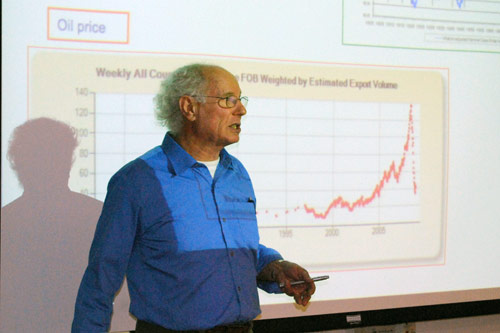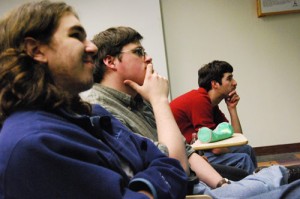Energy, Medicine, Nanotechnology Topics at Physics Colloquium Series

An emerging worldwide energy crisis demands a new approach for a sustainable energy future.
“How we adapt will determine our future on this planet,” said physicist Fred Schlachter, during the Department of Physics’ Colloquium Series Feb. 26 in Exley Science Center.
Schlachter, a guest speaker from the Lawrence Berkeley National Laboratory’s Advanced Light Source Division, is the co-author of Energy Future: Think Efficiency, a report that examines how America can look within to achieve energy security and reduce global warming. At Wesleyan, he gave a presentation titled “Over a barrel: A world wide energy crisis.”
The topic of energy is a key theme ongoing in the Physics Department’s Spring 2009 Colloquium Series. Other guest speakers, including three Wesleyan alumni, have discussed, or will discuss, nanotechnology, next-generation semiconductor fabrication, dark matter detection and crystal pattern formation, to name a few.
“This semester’s series is particularly noteworthy in that several of the talks address issues surrounding the energy crises,” says Tom Morgan, the Foss Professor of Physics and academic secretary. “An important component of the series is to identify alumni to bring back to campus to reflect on their careers and talk with faculty and students about challenging current topics and academic and professional career opportunities.”
The spring series continues:
March 26: James Warren, group leader of the Thermodynamics and Kinetics Group, Materials Science and Engineering Laboratory at the National Institute of Standards and Technology, will speak on “Modeling crystal growth: A thermodynamic approach to pattern formation.”
April 2: Jabez McClelland ’76 P’08, group leader of the Electron Physics Group, Center for Nanoscale Science and Technology at the National Institute of Standards and Technology, will speak on ““Measurements for Nanotechnology: How do they DO that?”
April 9: Charles A. Hall, professor of environmental and forest biology at SUNY Syracuse, will speak on “Energy economics.” Hall will present the results of his efforts for many years to reformulate economics in ecological/energy based terms.
April 16: Sam Slishman ’93 of the Endorphin Power Company, will speak on “Physics and medicine, the good and the bad: the story of a liberal arts physics major in the medical bubble.”
April 23: Brian Stewart, associate professor of physics, will deliver his “Second Annual Earth Week Rant,” an attempt to integrate the environmental, energy and societal issues he has been studying. The first rant was well attended last year.

“It astonishes me that at a university such as ours that prides itself on its progressive and environmentally conscious nature, there is virtually no public discussion of the most pressing issues facing mankind in their interlocking context,” Stewart says. “I hope that others better versed than I in some of these subjects will pick up the ball and run with it. Everyone craves the occasional opportunity to think about the big picture, and we seldom offer such an opportunity to the community.”
The series will conclude with the Bernard T. Bertman Lecture on April 30, and a talk by John Seager, president of Population Connection (formerly Zero Population Growth).
Some of the colloquium lectures double as classes for Stewart’s PHYS105 class “The Physics of Sustainability,” which focuses on the global population crisis. Stewart served on the Wesleyan Sustainability Committee in 2007, and pledged to the group to spend time during his sabbatical researching sustainability issues. In doing so, Stewart designed the building blocks to the PHYS105 course.
“Room 58 was nearly full during Fred Schlachter’s talk. My students asked many questions during our discussion, and I think his presence made a real difference in my course,” Stewart says.
Past spring colloquium speakers have included Greg Denbeaux ‘93 from the University at Albany, who spoke on “Extreme ultraviolet radiation for 22 nm resolution lithography – opportunities and challenges;” Daniel McKinsey from Yale University, who spoke on “Direct dark matter detection with noble liquids;” and Luca Dal Negro from the Department of Electrical and Computer Engineering at Boston University, who spoke on “Light in deterministic aperiodic structures.”
All talks are held at 4:30 p.m. in Room 58 Exley Science Center. Refreshments are served at 4:10 p.m. All talks are open to the public.
“The purpose of our colloquium is to provide a venue that allows for knowledgeable speakers to be on campus to discuss timely issues. These talks would be of interest not only to students at Wesleyan but also to the community of Middletown,” Morgan says.

